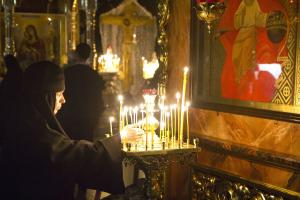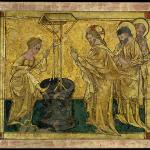
Tolkien mentioned that those who believe in a personal God find themselves drawn to God with a desire to honor and worship their Creator above the way they honor anyone and anything else:
Those who believe in a personal God, Creator, do not think the Universe is in itself worshipful, though devoted study of it may be one of the ways of honouring Him. And while as living creatures we are (in part) within it and part of it, our ideas of God and ways of expressing them will be largely derived from contemplating the world about us. (Though there is also revelation both addressed to all men and to particular persons.) [1]
We are drawn to God because God is love, indeed, transcendent love. The more we see the love of God in action, the more we will perceive God’s greatness, and that greatness will awe us, make us sit back and contemplate what perceive. This, however, is not just true for God. We find it is true in our relationships with others. They often enchant us by their good qualities, and we, in response, often think about them, indeed, praise them one way or another, because of the way their greatness inspires us. Thus, there is something natural about the desire we have to honor those who make us feel great, which is why we end up praising God when we apprehend God’s greatness.
There are many ways we can and will fulfill our desire to praise and worship God, not just the way many of us have grown accustomed to thinking, that is, by prayer, private or communal (such as at a liturgical service). We must not constrain our reaction to God and God’s love. We must embrace God and honor God in a variety of ways, not just one. as Blessed Theodoret of Cyrus, commenting upon Paul’s letters, explained, “There are many forms of worship: the one who prays worships God, as does the one who fasts, the one who heeds the divine sayings, and of course also the one who cares for strangers.”[2]
Each time we follow the way of love, engaging others through such love, we find ourselves honoring God, and so giving our creator the worship which God desires from us. What we do out of such love, like taking care of strangers (migrants, for example), or those who are poor and needy, must be seen as an act of worship, often a kind which is greater than simple prayer, for God has revealed to us that the divine heart lies with the poor and needy. And if this is worship, it can be said that acts which run contrary to such love, such as denying strangers or the poor of the care they need, is an affront to God, making it a kind of blasphemy.
Working to counteract any inordinate passions which would lead us to act unjustly, that is, engaging various forms of self-discipline like fasting, if that self-discipline is geared to purify our will so that we can better embrace the way of love, likewise can be seen as a way for us to worship and honor God. This is because we are trying to align ourselves with God, honoring and working for the same goals God has for creation. When we study to learn the ways of God, doing so to come to know God better, and acting upon what we learn, once again, we can be said to be honoring God, and so engaging God in an act of worship; the same, is true, when doing theological reflection, where we try to understand better what we have apprehended and share with others what we have discerned so that we can all come to know and love God that much more than we did before we did so.
We are to love God with all our heart. Of course, as sin has contaminated us, so our love will often be imperfect, but it is better to offer imperfect worship, to try to act out of love, than to give up on all attempts to do so. “He prefers to be worshiped in whatever way, even incompetently, provided it is in keeping with human nature, than not to be worshiped at all out of pride.” [3] We will likely find our love grows stronger the more we exercise it, which is why an imperfect love, such as found in imperfect contrition, can and will be effective and our worship, however mixed it is, can be pleasing to God, so long as the love which is there is real and we are trying to nurture it instead of strangling it in our lives. And one of the ways we do that is to do what we can to work for the benefit of our neighbor, for the more we do that, the more we will form the habits of love which can and then will overcome the habits of sin, even as imperfect contrition will be able to grow to perfect contrition, leading to the purification of the soul from all sin.
Love draws us in to God. We should do what we can to develop our love, for by doing so, we will find ourselves living our lives the way God intended us to live them out. The more we love, the more we will honor God, because God is love, which is why we should seek to develop our relationship with each other in such a way that love is the foundation of our engagements. “Let the soul remember that she owes her first love to God and her second to her neighbor, and that all her affections must be directed by this rule, that she should not withdraw from the worship of the Lord nor from the usefulness to the fellow servant.” [4] We should understand that we can and will embrace various forms of worship every day we live, because there will be many ways we can and will express our love. What undermines the will of God, what undermines the love which we should have, undermines and corrupts our worship. Sin, being unlove, resists proper worship, though it can and will try to replace the worship based upon love with worship which is legalistic and show, to make us believe we are holy for following legalistic expectations when, in reality, as we do so without love, we are only engaging the simulacra of worship. Nonetheless where love remains, there remains hope, hope that the love will grow, and all that is sin is cast off, so that in the end, there is hope that love, not sin, is victorious, and with it, we will come to know God by the way we have come to know love, not by study, not through theological speculation, but by experience.
[1] J.R.R. Tolkien, The Letters of J.R.R. Tolkien. Revised and Expanded Edition. Ed. Humphrey Carpenter and Christopher Tolkien (Broadway, NY: William Morrow, 2023), 562 [Letter 310 to Camilla Unwin].
[2] Theodoret of Cyrus, Commentary on the Letters of St. Paul. Volume One. Trans. Robert Charles Hill (Brookline, MA: Holy Cross Orthodox Press, 2001), 47-8 [Romans].
[3] Marsilio Ficino, On the Christian Religion. Trans. Dan Attrell, Brett Bartlett, and David Porreca (Toronto: University of Toronto Press, 2022), 54
[4] St Leo the Great, Sermons. Trans. Jane Patricia Freeland CSJB and Agnes Josephine Conway SSJ (Washington, DC: CUA Press, 1996), 71 [Sermon 19].
Stay in touch! Like A Little Bit of Nothing on Facebook.
If you liked what you read, please consider sharing it with your friends and family!
N.B.: While I read comments to moderate them, I rarely respond to them. If I don’t respond to your comment directly, don’t assume I am unthankful for it. I appreciate it. But I want readers to feel free to ask questions, and hopefully, dialogue with each other. I have shared what I wanted to say, though some responses will get a brief reply by me, or, if I find it interesting and something I can engage fully, as the foundation for another post. I have had many posts inspired or improved upon thanks to my readers.













